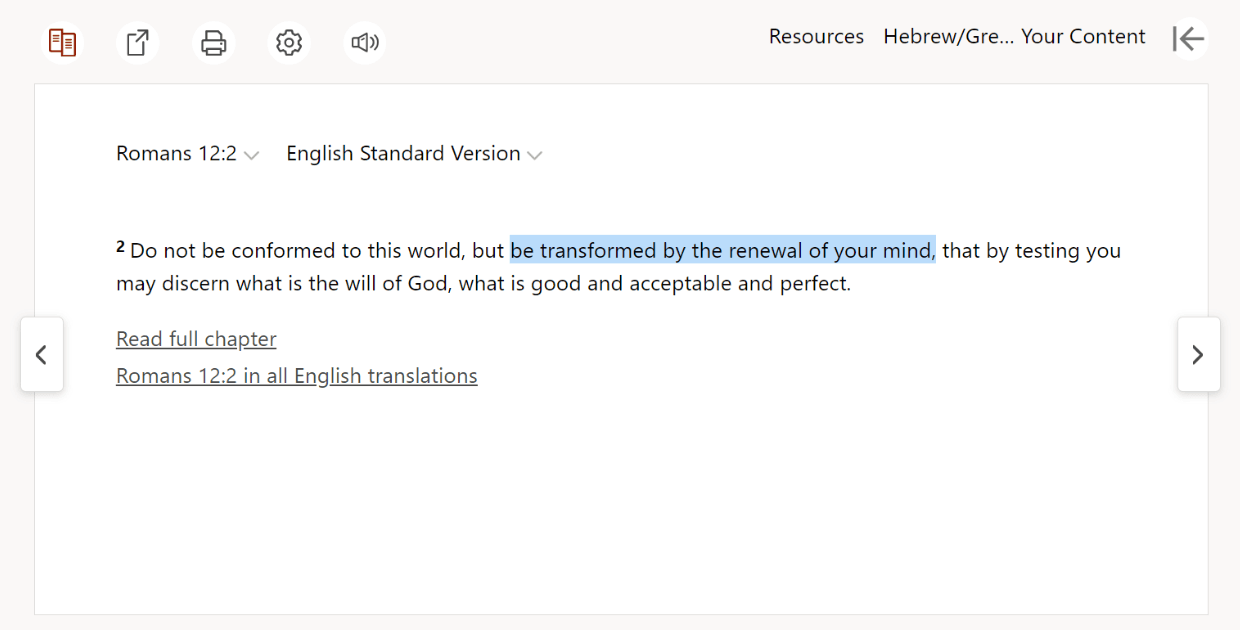
From Isolation to Integration
 img:biblegateway.com
img:biblegateway.comI am not the first person, by far, to observe that the “smartphone” has become a ubiquitous aspect of 21st century life.
And before I share the following statistics with you, I want to make clear that the smartphone is not a boogeyman. It is simply the newest device exacerbating the ancient human problem of loneliness and isolation.
Isolation is what I want to talk with you about today. But first, let’s see those smartphone statistics. (Sources are included as links)
- 91% of mobile phone users are active on social media. 5.17 billion people use social media worldwide, and 86.1% of people aged 18 and older are active on social media.
- 98% of young adults use their phones during social gatherings, compared to 69% of people aged 65 and older. Men are more likely to use their phones for certain activities during social gatherings, such as receiving calls, checking for alerts, and placing calls.
- Adolescent females are more likely to be dependent on and influenced by their smartphones than adolescent males.
- In 2023, the average time spent using the internet on a smartphone per day was about 3 hours and 50 minutes.
- Smartphone ownership has increased among all age groups in the U.S. since 2012, but especially among people aged 65 and older.
You don’t need the statistics, you can see it with your own eyes.
Smartphones, however, are not the problem.
Loneliness, or isolation is the problem, and the smartphone is just the latest ingenious device with which we attempt to prevent ourselves from being reminded of this condition.
loneliness
Isolation is a painful aspect of the human experience.
We are probably all experiencing it to some degree most days. And if we are fortunate enough to be enjoying a reprieve, isolation lurks around every corner.
Take a moment to recall the pain.
Perhaps you were the kid who always got picked last during gym class.
Maybe you were mocked because you wore thick glasses or pants that didn’t quite reach your shoelaces.
People feel it when their professional achievements are poorly recognized.
Those are relatively innocuous sources of isolation compared to illness, death, divorce, betrayal, or any of a whole host of parasitic sinful conditions.
Sooner or later, and likely often, life in this world is going to force you into a confrontation with loneliness - the pungent feeling of isolation.
Psychiatrists and clinical psychologists cite it as the most frequently expressed complaint, and point to it as a root cause of alcoholism, drug use, headaches, stomach and low-back pain, and even traffic accidents.
The reason the smartphone is such a potential danger is because of how efficiently it grants access to such things as pornography, competition and rivalry (via social media), distraction, counterfeit community… It’s the perfect isolation chamber.
Again, I’ll say it, the smartphone is not the root of the problem. All human cultures have devised mechanisms for the avoidance of the pains of isolation and loneliness.
Darkness
Heman the Ezrahite clearly knew a thing or two about isolation.
The last verse of his Psalm 88 is practically a definition of loneliness, perfectly captured by The Message, “the only friend I have left is Darkness.” (Ps 88:18)
What makes Psalm 88 so insightful is that Heman is dealing with his painful isolation without the balms offered by his culture.
He is praying and listening to, and trusting in God.
David, a contemporary of Heman, could have taken a lesson.
David’s disastrous bout with isolation resulted in murder and adultery.
The bible is filled with narrative warnings against the mishandling of loneliness, David’s being one of the more famous.
In some respects, one can quickly draw parallels between David’s sinful balm and our own society’s addiction to the smartphone.
There is much danger when isolation drives us into the arms of anything other than God.
No friend, no lover, no drug, no screen, no game, no politics, no attention, not even the best husband or wife can be a final solution for loneliness.
Any one of those things, if properly provided by God, can be part of God’s solution to the problem of isolation.
But all of those things, if approached with Messianic expectations, will always throw us deeper into the problem, until darkness is our only friend.

renewal
It might surprise us, then, that the biblical solution to the human problem of isolation is not simply to surround ourselves with people.
Getting married does not solve the loneliness problem any more than joining a small group does.
Paul’s proclamation in Romans 12 (at the top of this article) is not to be transformed by “going to church”, by “getting married”, or by “surrounding yourself with distractions”.
Paul talks about a renewing of the mind.
Your mind is profoundly yours… alone… but that does not automatically mean you must be lonely.
integration
The English word “integration” is derived from the Latin word meaning “renewal”, which is exactly what Paul talks about in Romans 12:2.
And so if we do a little bit of word-play, Paul would suggest that the path which leads away from isolation is the path towards integration - of the mind.
There’s a certain kind of inner self work that must take place if we are to ever solve our loneliness problem.
It is probably impossible to move from isolation to integration without any form of withdrawal from a distracting world.
So one practical piece of wisdom here is this: if you can identify something in your life that you are accessing as a means of treating your isolation and the feeling of loneliness, it’s a good time to set some boundaries.
It’s a good time to take a chunk out of the amount of time or energy you are putting into that thing - and maybe it’s your smartphone - and invest that time and energy into renewing your mind.
Your mind is best known to you (aside from the obvious superiority of knowledge that God alone can claim.)
“Renewal of the mind” is a phrase that almost demands solitude as a precondition.
In other words, to move from isolation to integration necessarily means spending some time alone with your actual thoughts, feelings, and prayers.
But what does this solitude look like? Does it necessitate a hermitage? Must we all become monks?
No.
The solitude which results in a renewal of the mind does not depend on physical or emotional or psychological preconditions. It depends on God.
The precondition leading to the renewal - or integration - of your mind is that God loves you.
That.
Alone.
A man or woman who is convinced of God’s favorable disposition is no longer pulled apart by the most divergent stimuli of the surrounding world, but is able to perceive and understand this world from a quiet inner center.
They have been transformed, and the renewal comes from outside - from God - but its impact is profoundly inside.
It happens to you. To me.
from loneliness to renewal
Yes, we can talk another day about how God saves us in(to) community. Of course. Jesus died for an entire church, not just for little ole’ me.
But unless I’ve undergone an integration of my self - Paul’s “renewal of the mind” - I am at risk of turning the incredible gift of Christian community into a false messiah.
I end up seeking “church” in hopes it will provide the integration my soul desperately needs. Or I end up seeking integration through facebook.
Or I seek it with other behaviors, most of which lead to addiction, because those things cannot integrate my mind in the way God does. They keep me hooked on seeking.
And therefore they leave me isolated.
Let me be clear. It is important to be quiet and alone once in a while in order to avoid isolation, but it isn’t the quietness nor the aloneness that does the trick.
It’s that when you remove all other distractions, you are in a good position for God to begin His work of integration - a renewing of your mind.
It’s the same kind of thinking that is behind the old adage, “when you die, you die alone”.
When you are “integrated” - renewed by God - as an antidote to your isolation, you are integrated first alone.
In the words of Henri Nouwen, “Without the solitude of heart, our relationships with others easily becomes needy and greedy, sticky and clinging, dependent and sentimental, exploitative and parasitic, because… we cannot experience the others as different from ourselves but only as people who can be used for the fulfillment of our own, often hidden, needs.”
Thomas Merton writes, “It is in deep solitude that I find the gentleness with which I can truly love my brothers. The more solitary I am, the more affection I have for them. It is pure affection and filled with reverence for the solitude of others.”
And Rainer Maria Rilke, advising a young poet, said, “what is going on in your innermost being is worthy of your whole love.”
These three are not talking about the sinful drug of self-obsession. They are talking about the healthy condition of a fully integrated self - a mind that has been renewed.
Rainer Maria Rilke further explains this experience when he says, “Love… consists in this, that two solitudes protect and border and salute each other.”
Notice that all three of these great thinkers are using the word “solitude”.
And yet they are not talking about isolation.
What they mean by “solitude” is what Paul means by “renewal” and what I mean by “integration”.
True love (or any other kind of truth) cannot be fully realized when we fill our loneliness with distraction.
That isn’t true “solitude”, because solitude - a renewed mind - a fully integrated self - is actually intensely focused - on God and on Truth.
It’s been said a million times, you can be surrounded by people and feel completely alone.
And again, being surrounded by people isn’t the problem. Neither is it the solution.
But it is a gift which will be best appreciated by a mind that has been renewed by the love of God.
Being loved by Jesus makes you the most “human” you can be! It moves you from isolation to integration.
In that love, we become free to live a full life whether we are alone in a room with nothing, whether we are in the embrace of our spouse, or even when we are sitting in a room-full with our eyes tuned to our smartphone.
So pay attention to how you are dealing with isolation, either by attempting to hold it at bay or by surrendering to it entirely.
Set aside some of that energy to bask in the gracious love of God.
Closing Prayer
Heavenly Father, you sent your son into the world of isolation. So you know me. Help me to find some time to spend “alone with you”. Chase away the loneliness of isolation by renewing my mind in Jesus. Amen.



